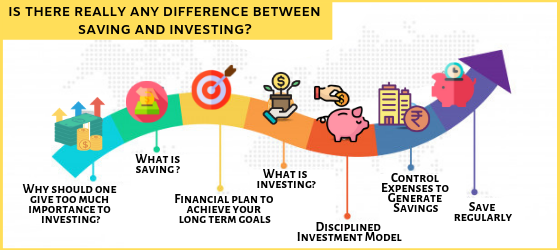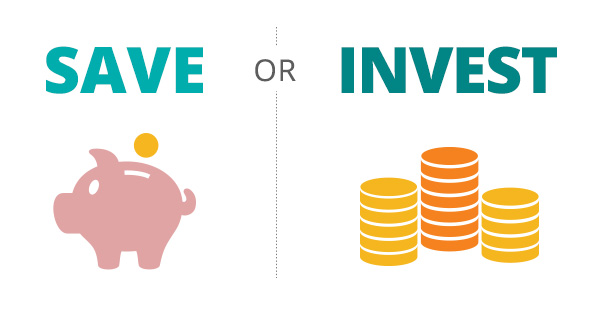Saving and Investing

Most of us get confused between saving and investment and often used them interchangeably, but there is a difference.
Both Saving and investing are two sides of the same coin as Heads and Tails.
Income - Expenses - Liabilities = Savings
Consider the aggregate monthly income and subtract the monthly expenditure and liabilities like food, travel, House rent, EMI and Loans, etc. the leftover is nothing but your savings. So, what is investing?
Well if you want your savings to grow than you need to invest which is nothing but investing
Let understand with an example here. Let say you have a box of mangoes and you have two options A and B.
A) Keep the box of mangoes safely and enjoy your mangoes whenever you feel like; or
B) You can take a few mangoes from the box and plant the mango seed and water it regularly. Eventually it will grow into a mango tree in few years. You can than enjoy your mango for rest of your life.
Option A is like savings and Option B of taking care of your plant in a disciplined way is nothing but investing.
The end objective of both saving and investment is to accumulate money.

Saving is setting aside the money for future use. Its money you want to be able to access quickly, with little or no risk, and parked in a safe asset or account to tackle emergencies and Investing, on the other hand, is buying assets with the expectation that your investment will make money for you and grow your wealth.
Saving products available in the market are Saving accounts, Fixed Deposits, PO Deposits, RD, Liquid, and Debt MFs, etc. Investment products available in the market are Equity, Mutual Fund, Real Estate, and Long term Debt.
Savings are selected to achieve short term goals and Investments usually are selected to achieve long-term goals.
Return on saving is usually equal to less than the inflation rate in the economy as they carry little or no risk. The potential return on Investment is usually higher than the inflation rate in the economy. Higher the return, Higher the risk.
What is Inflation?
Inflation is nothing but an increase in the general level of price of goods and services in the economy over a period of time.

How does inflation affect our savings and investment choices?
Let’s say you have a financial goal to send your child for higher education after 10 years. The present value of the goal is Rs 50 Lakhs. You can save Rs 5 lakh each year till 10 years and after 5 years you will accumulate Rs 50 Lakhs i.e. 5*10= Rs 50 lakhs.
But do you think the future value of your goal will be the same? The answer is “No”. Considering 6% inflation the future value of your goal will be Rs 89.5 Lakhs.
You can now either increase your savings from Rs 5 Lakhs to Rs 9 Lakhs or you can choose a smarter option. Yes, you are right to INVEST. Investing will allow you to grow your money in a disciplined way with a lesser amount of savings.
Saving will help you plan your financial goals but investing will help you achieve your future goals.
Five key takeaways
- Both the Saving and Investment end objective is to accumulate money.
- Savings are selected to achieve short-term goals and investments to achieve long-term goals.
- Save regularly and Invest.
- Control your expenses.
- Invest wisely.
Stay tuned for more updates. Until then …. Adios from Marketgoogly:)
Disclaimer
No content on this blog should be construed to be investment advice. You should consult a qualified financial advisor before making any actual investment or trading decisions. All information is a point of view and is for educational and informational use only. The author accepts no liability for any interpretation of articles or comments on this blog being used for actual investments.
While we may talk about strategies or positions in the market, our intent is solely to showcase effective risk-management in dealing with financial instruments. This is purely an information service and any trading done based on this information is at your own risk. The information provided by Marketgoogly through its public channels such as Facebook posts, Tweets, LinkedIn, Telegram, WhatsApp, and YouTube is for educational purposes only and is not investment or tax advice.






Comment / Discussion